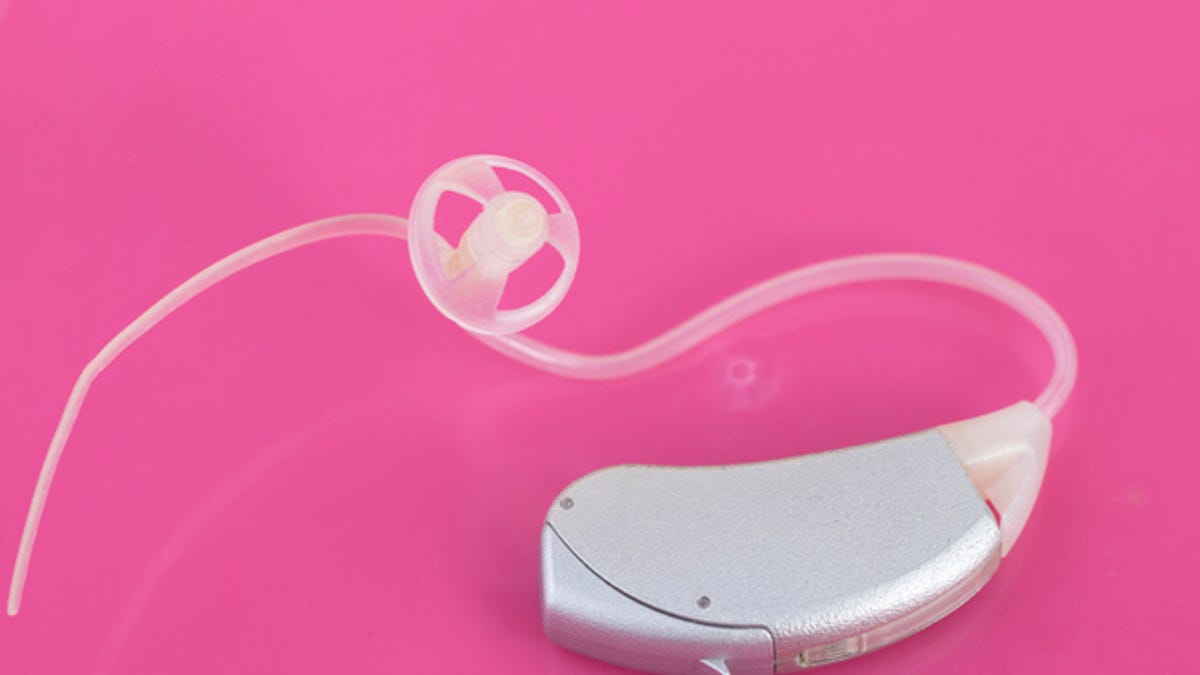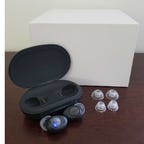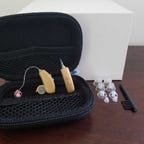The Best Over-the-Counter Hearing Aids to Try in 2023
If you’re struggling with hearing loss, you now have more options: You can get hearing aids over the counter without dealing with the hurdles needed to source them through a doctor. Over-the-counter hearing aids are relatively new, but there are already plenty of options to choose from.
I was able to get my hands on some of the top options for testing. I had a mix of over-the-ear, in-ear and in-canal hearing aids to get a full picture of the OTC hearing aid market and the performance of each style. To get the best representation of three varying degrees of hearing loss, I enlisted the help of my dad and grandfather for testing. My grandfather is a hearing aid expert who’s worn hearing aids for decades. To balance out his obvious preference for traditional hearing aids, my dad’s thirst for new technology helps gauge the standard consumer experience. And then there was me, for the technical side of device information that you should know.
While testing, we considered how easy the hearing aids were to set up, the fit and app performance. Below you’ll find our testing experience with the best over-the-counter hearing aids, and the pros and cons of each device.
What is the best hearing aid overall?
Over-the-counter hearing aids from Audicus currently top our list because they are a great balance of advanced features and accessibility. I reviewed the Omni hearing aid, the premium rechargeable hearing aid option with directional microphones, remote adjustments and Bluetooth. That sounds like a lot, though it looks and functions exactly how you expect from traditional hearing aids.
The Omni is $2,998 for a pair, which is definitely not the most affordable option; however, the customer support and quality make it worth it. Not to mention the fact that you can finance your devices. There are also other models from Audicus that you can choose from. You might sacrifice some of the bells and whistles, though you’ll still get excellent support from the company.
Our picks for the best over-the-counter hearing aids
One of the main concerns people have regarding OTC hearing aids is setting up the devices on their own. Without a doctor, it can feel daunting to solve your communication needs, and that’s a primary barrier to the over-the-counter hearing aid market.
The Eargo 7 OTC hearing aids may be the smallest hearing aids I’ve ever seen. One hearing aid is barely longer than the length of my fingernail and half as wide. I would consider them a “micro” hearing aid that sits fully in the ear canal. You can’t see them from the side, so they are my pick for the best invisible-fit OTC hearing aids. They’re great for people who want a discreet hearing-aid experience or whose hearing devices are susceptible to being bumped or brushed. They’re also good for people who wear glasses.
The Jabra Enhance Plus OTC hearing aids have a classic earbud look. So much so that the average person likely would mistake them for Bluetooth headphones. The fit is similar to a headphone and visible while wearing it, but really lightweight and comfortable. At no point did I feel they would fall out of my ears, though I could see how after a full day of wear, you would look forward to taking them out.
Lucid Hearing’s Engage Rechargeable OTC hearing aid reminds me of a classic over-the-ear hearing aid. It has a battery flap at the bottom, which is also rechargeable thanks to the relatively chunky case. (I wouldn’t say it’s something you want to carry in your pocket.)
If you’re looking for a simple, straightforward OTC hearing aid, consider the Sontro Hearing Aids from Soundwave Hearing. They were one of the favorite picks of my grandfather for comfort and use. He was able to get them into his ear the easiest. They resemble traditional hearing aids with their over-the-ear design and battery flap on the bottom. These hearing aids are completely battery dependent, with no rechargeable case. Soundwave Hearing includes four batteries with their devices.
All the OTC hearing aids I tested included manuals that walk you through how to use the devices. In addition to the packaging, several online videos are available on the Hearing Assist website and YouTube if you have questions. They are particularly helpful if you learn best when seeing someone walk through the device and app. Since most OTC hearing support is through email or phone, I thought this was a nice attempt to bridge the gap. Hearing Assist also offers appointments with its hearing specialists for additional help.
How we tested the best OTC hearing aids
OTC hearing aids are intended to make hearing assistance accessible to everyone. They are generally more affordable and do not require a doctor’s appointment for purchase. Because of this, we approached testing the best OTC hearing aids with a holistic mindset. Our goal was to gauge the entire experience of ordering, setting up and using the devices.
We considered several factors during the testing process.
- Battery life and charging cases
- Pricing and financing options
- Special features like directional microphones, Bluetooth, app connectivity and feedback suppression
- Comfort and ease of wearing
- Customer support
- Performance
In addition to our hands-on testing, we looked through user reviews for the product and the apps to fully understand long-term performance.
What are over-the-counter hearing aids?
Over-the-counter hearing aids are a new class of hearing assistance devices you can buy without visiting a doctor. The FDA has established regulations that OTC manufacturers must follow to ensure the devices are safe and effective. They are available for adults ages 18 and over with perceived mild or moderate hearing loss. They are not suitable for those with severe hearing loss or children.
“These devices are available for purchase without the involvement of a licensed healthcare professional; they are subject to regulatory criteria such as output (e.g., loudness) limits and design requirements to ensure that they work well and are safe for consumers,” says Lindsay S. Creed, associate director of audiology practices at American Speech-Language-Hearing Association.
On the surface, OTC hearing aids don’t seem all that different from prescription options. They look and operate similarly. According to Creed, the main differences between the two types are “how they are sold, the regulatory criteria they must comply with and who they are intended for.”
How do I know if I should get over-the-counter hearing aids?
OTC hearing aids are only approved for adults with mild or moderate hearing loss. Children with hearing loss or those with severe hearing loss should seek professional assessments to determine their hearing needs.
So, how do you know if you should buy OTC hearing aids? Generally, hearing loss happens gradually over time. You may not even know it’s happening.
Common signs you have hearing loss include, but are not limited to:
- Mishearing words or asking people to repeat themselves
- Having a difficult time following conversations when you’re in a noisy environment
- Things sounding muffled
- Having to turn up the volume to hear music or TV
While you aren’t required to have a hearing assessment before buying OTC hearing aids, Creed still recommends it, especially since most health insurance plans cover the cost of a hearing evaluation.
“The best way to know if you need hearing aids is to see a certified audiologist for a comprehensive audiological evaluation. This will tell you if you have hearing loss and, if so, what type and how severe. This information, taken together with your lifestyle needs and goals, will help you decide whether an OTC hearing aid is your best choice or if your needs would be better addressed by a prescription hearing aid,” says Creed.
What are the different types of hearing aids?
All hearing aids enhance how you hear and communicate in your environment. But they do it in different ways and with varying features. They also look different. One of the most important choices you must make while shopping for hearing aids is the style you want to wear. There are three main hearing aid styles — behind-the-ear, in-the-ear and in-the-canal.
- Behind-the-ear hearing aids: Most people think of this style when they picture hearing aids. The device sits behind the outer ear with a wire that wraps around the front and ends in a dome that fits in the canal. Behind-the-ear hearing aids are generally the most affordable option and are so light you can’t feel them. However, they aren’t as discreet as other options and can be hard to put on if you have dexterity issues.
- In-the-ear hearing aids: As the name suggests, this style of hearing aid fills the ear. The ones I tested look like any other Bluetooth headphone on the market. In-the-ear hearing aids are light and easier to insert than over-the-ear options. However, this style is slightly more expensive, and some people complain of hearing an echo when they speak.
- In-the-canal: There are two types of in-the-canal hearing aids — in-the-canal and completely-in-canal. The Eargo 7 hearing aids are examples of a completely-in-canal style because they are invisible from the side. These are great for people who want a discreet look. However, they are generally more expensive and are the most susceptible to ear wax build-up.
What to consider before buying over-the-counter hearing aids
OTC hearing aids vary by their capabilities and technology. Some devices have directional microphones, while others can use Bluetooth to stream music and phone calls directly to your hearing aids. Thinking about your lifestyle and what features you value most before purchasing is important.
Keep these factors in mind when shopping for the best over-the-counter hearing aids:
- Hearing aid style: Several styles are available on the OTC market. Traditional over-the-ear options sit behind the ear with a wire that wraps around the front and into the canal. There are also in-ear and in-canal options available. Depending on your lifestyle and needs, some may be more comfortable for you.
- App connectivity: Given OTC hearing aids don’t require a doctor’s visit, they are extremely accessible. However, one thing to consider is how dependent a device is on an app to function. Many people value remotely adjusting their hearing devices from their phones. Though if you don’t have a smartphone or prefer to adjust with buttons on the device, you should not buy one that depends on the app to change settings.
- Price: OTC hearing aids are generally more affordable than prescription hearing aids. However, because they are new to the market, insurance companies have yet to cover them. There is a wide range of prices, many with financing options that make them even more affordable.
- Customer support: One potential downside of OTC hearing aids is virtual customer support. In most cases, you won’t be able to meet in person with company specialists for help. To replace this, OTC companies offer robust manuals, online videos and phone calls to support customers with setting up and maintaining their devices.
- Trial period: Like with any product you buy online without holding it beforehand, it’s important to ensure a trial period. This will allow you to try and return the product if it’s not the right fit for you. All the products on our list offer trial periods.
Creed advises people to pay close attention to the labeling of OTC products. “Ensure the words ‘OTC’ and ‘Hearing Aid’ are on the packaging. Be wary of devices labeled as ‘hearing aid-like devices’ or ‘hearing assistive technology’ or those that are advertised as appropriate for children or greater than a moderate degree of hearing loss.”
“Amazon has already had to crack down on so-called ‘rouge’ sellers, so it’s really important to be aware of suspicious or too-good-to-be-true claims,” Creed says.
Over-the-counter hearing aid FAQ
How does insurance work with over-the-counter hearing aids?
Your coverage will depend on your plan, though many plans do not cover the cost of OTC hearing aids. The OTC market is still young, and it is unclear if insurers may cover them in the future is still being determined.
Do I need to go to the doctor to get an OTC hearing aid?
You do not have to visit a doctor’s office for a hearing assessment to purchase an OTC hearing aid. However, if you have the means, it’s still a good idea to visit an audiologist to assess your needs, determine your level of hearing loss and the potential cause.
How do I clean hearing aids?
Hearing aids are susceptible to wax and debris buildup, which can compromise the performance of the devices. Most OTC hearing aid manufacturers include cleaning tools like brushes and hooks to clean through the crevices under and around the ear molds.
Where can I buy over-the-counter hearing aids?
Are over-the-counter hearing aids as good as prescription hearing aids?
For all the latest world News Click Here



